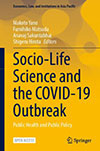-

-
Socio-Life Science and the COVID-19 Outbreak
-
Edited by YANO Makoto, MATSUDA Fumihiko, Anavaj SAKUNTABHAI, HIROTA Shigeru
Author's Introduction
In this book, we proposed research on what we call socio-life science. By socio-life science, we mean a field of research in which both social- and life-science factors are integrated in the study of humanity. 29 authors with different sets of expertise contributed to this book. Faced with the COVID-19 pandemic, the authors all saw the great importance of building socio-life science.
Personally, life science is one of the most exciting fields of science right now. Many new discoveries are being made on what life is about. I hope this may provide a new key to understanding what society is and what human beings are as social creatures.
Social science and life science complement each other very well. As a social scientist, I have always been interested in what holds a society together. In social science, social bonds are measured by means of what is called social capital. It is often assumed that the amount of social capital depends on such social scientific factors as income, wealth, education, sex, job experience, and childhood experience, etc. At the same time, however, it depends on genetics and physical and mental health. For a life scientist, what determines human health is an important question. It obviously depends on physical and mental factors as well as genetic factors. At the same time, health depends on social scientific factors. As this shows, it is impossible to understand humans without evaluating all these social scientific and life scientific factors together. This is what I want to understand as a social scientist and what my colleague Professor Fumihiko Matsuda of Kyoto University wants to understand as a life scientist. This is how we started our project seven years ago.
More generally speaking, I believe that the integration of social and natural sciences is one of the most urgent issues facing Japan. The problem is that many specialists are too focused on their specializations. Many observers have found that too many silos exist not just within the science and technology fields, but in other domains such as bureaucracy. In a stable environment, having silos makes perfect sense, but in today's world of drastically and rapidly changing technologies, rigid silos only hamper innovation. I want to experiment how one could "flatten" these silos in the field of science and create a new scientific approach for Japan.
Facing the COVID-19 pandemic, all the studies in the book emphasized the role of behavioral change and governmental policy to combat the menace this pandemic represents. In my own research, I found that political factors matter quite a lot in determining the spread of a pandemic at an early stage of an outbreak. Obviously, the spread of a disease is a natural phenomenon, but what political leaders do is critical in determining the way in which it spreads. The way in which political leaders deliver messages is also important. What political leaders do sometimes overwhelms such social-scientific factors as education, employment, and income. This is perhaps because information that political leaders deliver to the public is highly important in controlling a pandemic.
It is noteworthy that a chapter on sharing of research data using blockchain is included in this book. Blockchain is an internet technology that makes it possible to assign unique ownership to each piece of digital data. It is also possible to run programs on the blockchain. What makes blockchain unique is that all transactions can be done in a very secure manner at a very low cost. For the scientific community, data sharing is important to advance scientific knowledge; I am hoping that our initiative contributes to the creation of low-cost and secure data sharing methods, and it will also contribute to the sharing of medical data for the better use at the level of medical practice in the future.
Our research on COVID-19 should continue even after this pandemic subsides. The data we are putting together right now is important to understand how to induce behavioral change in the face of any similar crisis.




